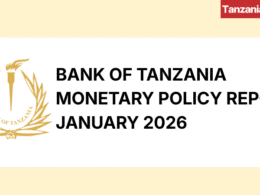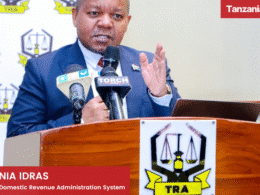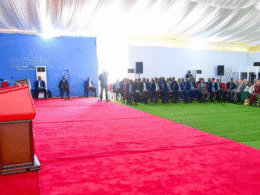TanzaniaInvest met with Colonel (Retired) Fred Mwesigye, the High Commissioner of Uganda to Tanzania, for a comprehensive discussion centered on investment opportunities in his country.
High Commissioner Mwesigye provides crucial insights into Uganda’s historical, economic, and diplomatic relations with Tanzania, emphasizing the enduring collaboration between the two nations, particularly in trade and security, and highlights key sectors that present attractive investment prospects.
This dialogue is especially pertinent for investors considering Tanzania, as it unveils the vast potential and stability that Uganda offers as an equally compelling investment destination.
Can you provide an overview of the historical diplomatic and economic relations between Uganda and Tanzania?
Uganda and Tanzania are really deep sisterly countries, from the 1960s when both countries attained independence till today. Tanzania has been part of the revolutionary struggles and liberation of Uganda from dictators and wrong political actors. We have seen our relations become deeper and stronger in various areas such as trade relations which have been increasing ever since.
Imports from Tanzania reached $ 451 million in FY 22/23 while exports from Uganda to Tanzania reached $ 127 million. This shows the closeness the two countries have as they grow together.
Imports from Tanzania reached $ 451 million in FY 22/23 while exports from Uganda to Tanzania reached $ 127 million. This shows the closeness the two countries have as they grow together.
Furthermore, as founding members of the East African Community (EAC), the two countries have worked jointly to maintain security and ease tension in the region. This is based on an ideology of respect for internal matters, dialogue, and sustainable solutions. It’s no secret that an insecure region affects socio-economic development so both sides have been committed to various initiatives established at a bilateral level, under the EAC and the African Union (AU).
Strong and deep relations between the two countries are also the foundation to encourage investment attraction in both countries. Currently, this is being seen in the implementation of various projects such as the Kikagati-Murongo Hydropower Plant, the Nshongeza Hydropower Plant, the transmission lines from Mutukula-Mwanza, the EACOP oil pipeline, and the Tanzania-Uganda gas pipeline.
This depicts a symbol of unity and stability for the two countries and this automatically gives confidence to the investors.
Can you provide us with an overview of the Ugandan economy and its recent developments?
The Government of the National Resistance Movement under the able leadership of President Yoweri Museveni ushered in peace and stability in 1986, this has seen the economy of Uganda steadily growing at 6.5% per annum for the last 36 years.
The economy of Uganda has been steadily growing at 6.5% per annum for the last 36 years.
Although ours is an agro-based economy (with over 50% of all the arable land in East Africa), major strides have been made to invest in educating a population of which over 75 % are young people below the age of 30.
We’ve developed our manufacturing capacity, establishing industries and zones for various products, including construction materials, pharmaceuticals, and textiles.
Additionally, major investments in infrastructure development and now in the oil and gas sector allow us to be on the right track for further economic growth.
What are the sectors that present the most attractive investment opportunities?
The country’s vision 2040 entails a major focus on agro-industrialization; manufacturing; energy, with a focus on renewables or clean energy i.e. geothermal; extractives industry such as mineral development and oil and gas; tourism; financial services; ICT and innovation just to mention a few.
The country’s vision 2040 entails a major focus on agro-industrialization; manufacturing; energy, with a focus on renewables or clean energy i.e. geothermal; extractives industry such as mineral development and oil and gas; tourism; financial services; ICT and innovation just to mention a few.
There is also a huge potential to invest in business outsourcing hubs in the country, given the ICT infrastructure and the skilled workforce with the necessary expertise.
The real estate industry is also growing rapidly with Uganda having a housing deficit of 2.4 million.
Tourism has shown growth in domestic numbers and there is the need for more development of hotel facilities and accompanying logistics.
How do Uganda’s strategic location and resources play a role in attracting investors?
Uganda enjoys a unique location along the equator, in the heart of Sub-Saharan Africa within the East African region. We border South Sudan in the north, Kenya in the east, the United Republic of Tanzania in the south, Rwanda in the southwest, and the Democratic Republic of Congo in the west.
This land-linked position gives Uganda a strategic central commanding base making it a gateway to both regional and continental business. This allows us to be a vantage point to access the EAC market which is over 300 million people; the COMESA of about 600 million, and now the AfCTA of over 1.3 billion.
Uganda has a strong natural resource base endowed with fertile soil and a favorable climate, and over 50% of the arable land in East Africa. This puts us at an advantage to grow many agricultural products organically.
Uganda has a strong natural resource base endowed with fertile soil and a favorable climate, and over 50% of the arable land in East Africa.
Additionally, Uganda is known as the Pearl of Africa due to our rich and untapped tourism offering. There’s a lot to see and do in Uganda from the big 5, to rare species like the mountain gorilla whose largest population is singularly in Uganda, to the source of the River Nile. I can only say come explore the Pearl.
Uganda is also rich in largely unexploited mineral deposits. We have all minerals except Tanzanite. These include iron ore, gold, phosphate, rare earth minerals which are a base material for the electronics industry, and wolframite, to name a few.
Uganda is also rich in largely unexploited mineral deposits. We have all minerals except Tanzanite.
So I can assure you that our potential is tremendously big and we are ready for business.
How conducive is the investment climate, and what incentives are in place to welcome investments?
The investment climate is very favorable with a wide range of tax and non-tax incentives for strategic sectors, to attract and retain investments in Uganda.
The investment climate is very favorable with a wide range of tax and non-tax incentives for strategic sectors, to attract and retain investments in Uganda.
For example, fiscal incentives under the Uganda Free Zones Scheme include 10-year tax holidays; tax exemptions on plant and machinery; and unrestricted remittance of profits after tax.
Doing business is fast and straightforward, with company registration and issuance of an investment license done in 1 day, via the Uganda Investment Authority (UIA) one-stop center, online or in person.
Uganda’s connectivity and infrastructure, such as roads and telecommunications, have significantly improved, creating a conducive environment for investments.
Uganda’s connectivity and infrastructure, such as roads and telecommunications, have significantly improved, creating a conducive environment for investments.
Last but not least, Uganda is a stable and secure country, with a skilled and affordable workforce.
How does the High Commission assist investors in navigating the Ugandan business environment?
The High Commission is actively pursuing Uganda’s key objectives in commercial and economic diplomacy. Our role is to ensure that we identify key areas of Uganda’s interest and match them with relevant partners.
The High Commission facilitates linkages between the companies/businesses to the relevant stakeholders in Uganda to ensure that the result is met on both sides. We actively participate, coordinate, and organize promotional activities and events to highlight investment opportunities, trade potential, and tourism.
We plan to organize the Uganda-Tanzania Investment and Trade Forum in May 2024.
For example, we plan to organize the Uganda-Tanzania Investment and Trade Forum in May 2024.
What final message would you like to convey to potential investors considering Uganda as their next investment destination?
Uganda is ready for investment in all sectors as I have mentioned above and I welcome you to the Pearl of Africa.











